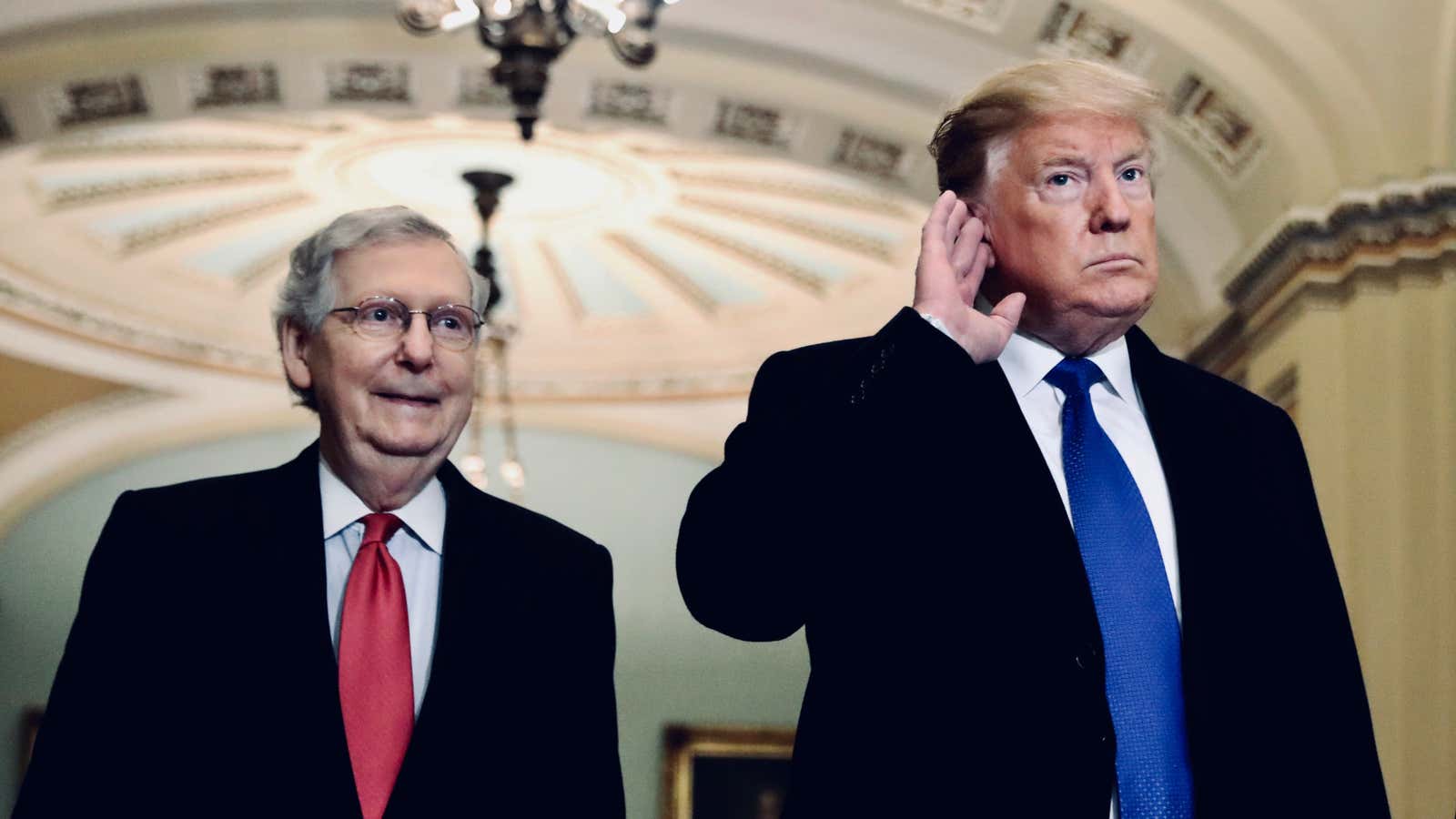It’s no secret that a presidential impeachment trial in the US Senate, whatever evidence is or is not presented, will end with Donald Trump’s acquittal. Republican majority leader Mitch McConnell has promised it.
But if the vote were conducted in secret, it seems, 30 or more Republican senators would find the president’s dealings with Ukraine violated the Constitution. Or so said former Arizona senator Jeff Flake in September.
Ever since, academics and pundits have been discussing the merits and drawbacks of a secret vote, while laying out the logistical path for approving cloaked ballots.
Procedurally speaking
Senators could approve a secret impeachment vote if they wanted to. Impeachment trial rules are up to the senators and must pass by a simple majority—51 out of 100 members.
Republicans are now in the majority and have 53 votes. If they all toe the party line, McConnell can more or less design whatever trial he thinks will best advance his stated goal of acquitting the president. That wouldn’t include a secret ballot: McConnell is looking to vocally signal his party’s enduring support for Trump, not offer politicians an opportunity to vote their conscience.
Still, it wouldn’t take much right-wing resistance to force McConnell to cede to a secret ballot, as Juleanna Glover, a former adviser to president George W. Bush and other Republican politicians, noted in Politico. If just three Republicans premised their approval of the rest of the rules on a cloaked vote, they could make it happen.
Procedurally speaking, if there’s a will, there’s a way.
But other questions remain. For one thing, senators are elected representatives and we, the people, might rightly expect to be privy to their true opinions and for them to go on the record with critical decisions, especially on this question of presidential ethics.
For another, if the only way some senators can fulfill their constitutional duty to objectively judge the evidence and decide on guilt or acquittal is under the cloak of secrecy, it’s fair to ask whether they are up to the task of governance. Do they have the moral fiber to lead? Or, as one Twitter user crudely put it in response to talk of a mystery posse of Republican resistors, “profiles in pisspants.”
Speaking up for secrecy
C-Span has long been broadcasting politicians at work—only the stodgy Supreme Court has managed to keep the judiciary free of the pesky postmodern eye of the camera. As a culture, we believe in transparency and see it as a virtue unto itself. If we can observe the wheels of government turning, we can ensure this unwieldy machine is operating properly, goes the conventional wisdom.
This certainty, however, ignores the observer effect of physics, which acknowledges that the act of being watched changes the actions of the object observed, whether that “object” is microscopic matter or human beings.
That’s why Columbia law professor David Pozen and Berkeley Law’s Jonathon Gould wrote in The Atlantic this month that “the Senate impeachment trial could use a little secrecy.” Senate tradition and democratic theory both support a partially confidential procedure, they argue. Transparency’s virtues are contextual, not absolute:
Many norms of congressional transparency are of quite recent vintage…The effects have been decidedly mixed, as study after study has shown that more open government does not necessarily mean better government. An American Political Science Association task force found in 2013 that “sunshine laws” have undermined negotiation, exacerbated gridlock, and enhanced special-interest influence in the Capitol.
Past impeachments involved taking private testimony; if it would allow the senators to exercise independent judgment and act for the people above party, then there’s no reason not to extend the cloak to votes. This would be in keeping with tradition and democratic ideals, ensuring the senators act as delegates and trustees for the Americans they represent, according to the professors.
Plus, a secret vote on guilt or acquittal isn’t exactly novel. Jurors deliberate confidentially at trial; voters cast secret ballots. So why not?
Against secrecy
The impeachment trial isn’t a proceeding like any other. It’s a constitutional process, not a criminal one. It’s a legal and political affair. Neither life nor liberty are at risk and the jury consists of politicians, so it’s altogether different from your run-of-the-mill criminal case.
That is why a secret vote on impeachment in the Senate might raise constitutional questions and quickly get derailed. Article I’s “journal clause” allows 20 senators to demand a recording of “the Yeas and Nays … on any question.” Gould and Pozen note that a small minority of senators could and probably would invoke that clause, forcing their colleagues to go on the record.
The bigger obstacle to secrecy doesn’t lie in a technicality, however, but in the zeitgeist. Many so firmly believe in transparency that they consider anything less un-American and inherently wrong. The cultural resistance is strong, and that is problematic, too, the professors argue, as it is evidence of a fundamental mistrust of representatives.
In other words, if the only disinfectant is sunshine, the American people might get burned.
But if the culture resists, it’s perhaps because there is something suspicious about the idea that only secrecy can ensure senators do the jobs they are entrusted to do. As Flake pointed out in a recent Washington Post editorial, the Trump impeachment proceedings are a trial for the senators, too, and they will be judged.
If there are Republicans who believe Trump acted improperly, they should be willing to say so, even if it means falling out with the in-crowd. As it stands, however, it seems there are 30 to 35 senators in office who do not have the courage of their convictions.
